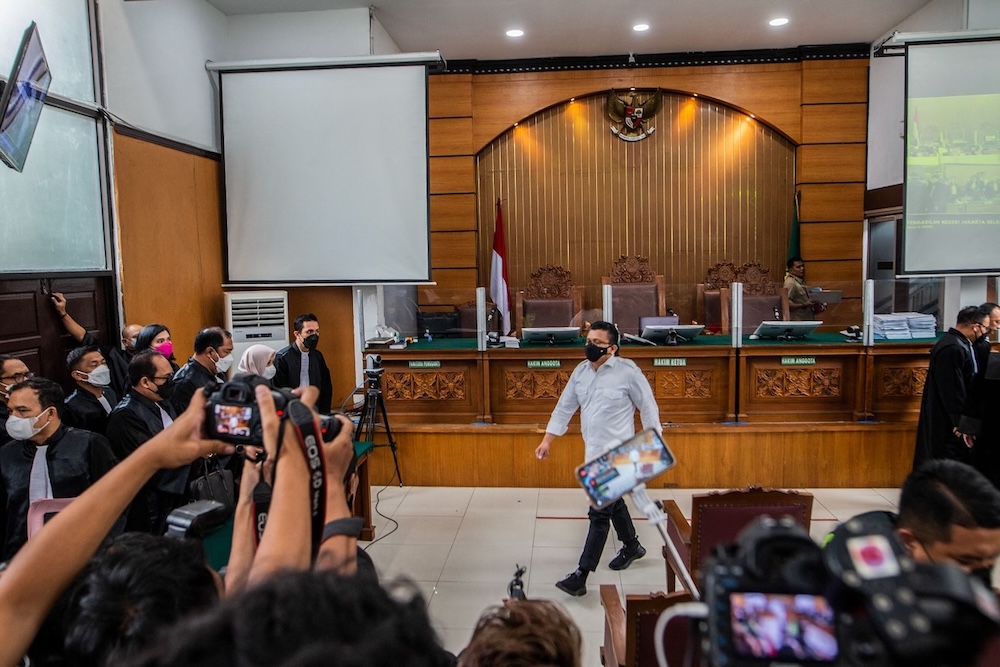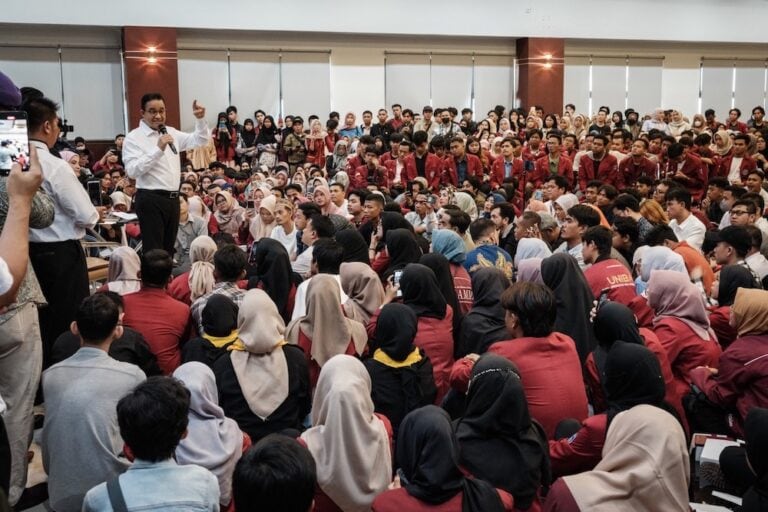Human rights groups said that the criminal law has been abused to silence critical voices.
This statement was originally published on globalvoices.org on 28 January 2025.
Private actor litigation against workers’ rights advocacy looms large in Indonesia
The Central Jakarta District Court in Indonesia has acquitted a worker who was criminally indicted for allegedly defaming her outspoken online entrepreneur boss, in the latest string of decisions based on the country’s highly controversial Electronic Information and Transactions Law (UU ITE).
Septia Dwi Pertiwi, a former marketing staff of an online business registration and consultancy platform Hive Five, went on X between November 2022 and January 2023 to speak out against exploitative working practices by her boss, Henry Kurnia Adhi (popularly known as Jhon LBF). In her tweets (no longer available), she alleged that the company had been paying her under the minimum wage, not paying her and other workers their overtime pay, cutting their salaries arbitrarily, and even withholding their personal documents such as degree certificates and marriage certificates, in contravention of the national labor law.
Jhon LBF had achieved a minor celebrity status in the Indonesian Internet for his viral content espousing his entrepreneurial acumen mixed with motivational aspirations, and flaunting his well-connectedness with prominent Indonesian corporate and government figures. He boasts 1.4 million followers on Instagram and 2.7 million followers on TikTok, which serve as the primary channels for him to promote his businesses, ranging from a law firm, to an electric scooter dealership, to a perfume store, and tax consultancy. Hive Five, which provides corporate registration services, is one of them.
After discovering Septia’s social media posts, Jhon LBF filed a criminal complaint with the police, which led the Central Jakarta State Prosecutor’s Office to charge her in August 2024 under three articles (Art. 27[3], 36, and 51[2]) of the 2016 amended version of the Electronic Information and Transactions Law (UU ITE), which criminalizes the electronic transmission of defamation. She was detained immediately after being charged.
In its criminal indictment against Septia, lead prosecutor from Central Jakarta State Prosecutor’s Office Maryani Melindawati argued, among others, that her tweets had caused Jhon LBF to lose his business deals, which fulfills the UU ITE articles requirement that defamation charges need to have been proved causing actual loss to the person defamed, and that her tweets had caused “disturbance to the general public”. The prosecution asked for one year of imprisonment and a fine of IDR 50 million (around USD 3,000).
The trial started on 10 September 2024, with Septia being defended by a coalition of lawyers aptly named Tim Advokasi Septia Gugat Negara Abai (“Septia’s Advocacy Team Suing the State for Negligence”). In its note of defence, the lawyers argued that voicing out against the violations of workers’ rights in social media should not be criminalized. A total of twenty-one hearings were held before a panel of three judges, which culminated with a verdict acquitting Septia of all charges and releasing her from detention on 22 January 2025.
Septia’s case has attracted a great deal of media attention in Indonesia and abroad; a coalition of 105 civil rights and labor organizations globally signed an international joint statement calling for her full acquittal. An excerpt of the statement:
We strongly denounce the baseless charges against Septia Dwi Pertiwi. Her prosecution highlights the plight of labor rights defenders in Indonesia, who face criminalization simply for exercising their freedom of expression in pursuit of justice.
Within the past year, UU ITE-related prosecution has resulted in the criminalization of people ranging from human rights defenders Haris Azhar and Fatia Maulidiyanti to Karimunjawa-based environmental rights activists Daniel Frits Maurits Tangkilisan.
Jakarta-based Institute for Criminal Justice Reform (ICJR) has criticized the prosecution’s choice of criminal articles to charge Septia, pointing out that the latest amendment to the UU ITE in 2024 has more lenient charges and effectively abrogated these articles, and that Indonesian criminal procedures required that the most lenient rule should be applied to the criminal defendant should there be a change in the criminal law. Specifically, Art. 27[3] of the 2016 UU ITE has been long highlighted by Indonesian human rights organizations as one of the most criminally repressive legal tools available for the prosecution. In another intervention submitted to the court, the Indonesian Legal Aid and Human Rights Association (PBHI) also argued that Septia’s actions were a legitimate “form of criticism and assessment as a former employee who never been heard of their aspirations of employees,” and that the prosecution was an effort to silence Septia and contravenes basic human rights principles.
A unique aspect of Septia’s case was that her prosecution originated from a complaint by a private party, while other cases were brought by government actors, and that the case has also been viewed in the larger frame of ongoing deterioration of Indonesian workers’ rights. The previous administration of Joko Widodo, with support from almost all political parties represented in the National Legislature, rolled out the controversial Job Creation Law in 2020 which relaxed a lot of labor protections and weakened the power of the already disorganized organized labor, which led to the mass protests, legal challenges, and repeal-and-rebirth of the law in 2023. His successor Prabowo Subianto, has vowed to fight for labor rights, but he also won last year’s presidential election by campaigning on the platform of continuing most of the Widodo administration’s policies.
For now, Septia’s acquittal was a welcome breath of fresh air to the country’s increasingly illiberal free speech environment and repressive digital scene. Nenden Sekar Arum of the Southeast Asia Freedom of Expression Network (SAFEnet) said:
The judge’s decision to acquit Septia is certainly good news, but this should not have happened when the law can be used so easily to criminalize people who demand their rights.
Written by Ramzy Muliawan



